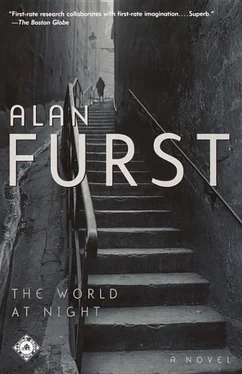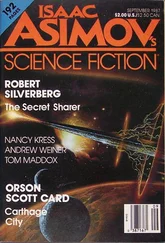Alan Furst - The World at Night
Здесь есть возможность читать онлайн «Alan Furst - The World at Night» весь текст электронной книги совершенно бесплатно (целиком полную версию без сокращений). В некоторых случаях можно слушать аудио, скачать через торрент в формате fb2 и присутствует краткое содержание. Жанр: Шпионский детектив, на английском языке. Описание произведения, (предисловие) а так же отзывы посетителей доступны на портале библиотеки ЛибКат.
- Название:The World at Night
- Автор:
- Жанр:
- Год:неизвестен
- ISBN:нет данных
- Рейтинг книги:5 / 5. Голосов: 1
-
Избранное:Добавить в избранное
- Отзывы:
-
Ваша оценка:
- 100
- 1
- 2
- 3
- 4
- 5
The World at Night: краткое содержание, описание и аннотация
Предлагаем к чтению аннотацию, описание, краткое содержание или предисловие (зависит от того, что написал сам автор книги «The World at Night»). Если вы не нашли необходимую информацию о книге — напишите в комментариях, мы постараемся отыскать её.
The World at Night — читать онлайн бесплатно полную книгу (весь текст) целиком
Ниже представлен текст книги, разбитый по страницам. Система сохранения места последней прочитанной страницы, позволяет с удобством читать онлайн бесплатно книгу «The World at Night», без необходимости каждый раз заново искать на чём Вы остановились. Поставьте закладку, и сможете в любой момент перейти на страницу, на которой закончили чтение.
Интервал:
Закладка:
Ah, Fischfang, Casson thought. You are my revenge.
Louis Fischfang was Casson’s writer. Every producer had one. Casson told the agents and screenwriters that he spread the work around, and he did-different people were right for different projects. But in the end, when the chips were down, when somebody had to somehow make it all come out right for the people who handed over their hard-earned francs for a seat in a movie theatre, then it was Fischfang and no other.
Though he quivered with political rage, spat and swore like a proletarian, marched and signed and chanted and agitated, none of it mattered, because that fucking Fischfang could write a movie script that would make a banker weep. God-given talent, is what it was. Just the line, just the gesture, just the shot. There could be no Jean Cassons- no Alexander Kordas, no Louis Mayers, no Jean Renoirs or Rene Clairs-without the Louis Fischfangs of this world.
Fischfang looked up as Casson approached the table. Offered his usual greeting: a few grim nods and a twisted smile. Yes, here he was, the devil’s first mate on the ship of corruption. Here was money, nice suits, ties, and the haughty 16th Arrondissement, all in one bon bourgeois package called Casson.
“Did you order?” Casson asked as he sat down.
“Kir.” White wine with blackcurrent liqueur.
“Good idea.”
“Royale.” Not white wine, champagne.
“Even better.”
The waiter arrived with Fischfang’s drink and Casson ordered the same. “It’s a strange day to work,” he said, “but I really don’t know what else to do.”
“I can’t believe it’s come to this,” Fischfang said angrily. “They”- in Fischfangese this always meant the government and the rich and the powerful- “they grew Hitler. Watered him and weeded him and pitch-forked manure all around him. They gave him what he wanted in Czechoslovakia and Poland-now he wants the rest, now he wants what they have. Hah!”
“So now they’ll stop him,” Casson said.
Fischfang gave him a look. There was something knowing and serious about it -you’re naive- and it made him uncomfortable. They sat for a time in silence, watched the crowd flowing endlessly down the avenue. Then Casson’s drink came. “Sante,” he said. Fischfang acknowledged the toast with a tilt of the tulip-shaped glass and they drank. Fischfang’s grandfather had crawled out of a shtetl in Lithuania and walked to Paris in the 1850s, Casson’s roots went back into Burgundy, but as they drank their Kir they were simply Parisians.
“Well,” Casson said acidly, “if the world’s going to burn down we should probably make a movie.”
Fischfang hunted through a scuffed leather briefcase at his feet and brought out a sheet of yellow paper crammed with notes and ink splatters. “Fort Sahara,” he said. He took a packet of cheap cigarettes; short, stubby things, from his breast pocket. As the match flared, he screwed up his face, shielding the cigarette with cupped hands as he lit it. “Lisbon,” he said, shaking out the match. “The slums. Down by the docks. Women hanging out washing on a line stretched across the narrow street. They’re dark, heavy, sweating. All in black. The men are coming home, in twos and threes, carrying their oars and their nets. Kids playing soccer in the street-tin can instead of a ball. Now it’s nighttime. Men and women going to the — cantina ? Wine’s being poured from a straw-covered jug. There’s a band, people dancing. Here’s a young man, Santo. He’s tough, handsome, sideburns, rolled-up sleeves …”
“Michel Ferre.”
“Yes? That’s up to you. For some reason I kept seeing Beneviglia- he speaks French with an Italian accent.”
“Hunh. Not bad. But remember, this is a quota film-life will go smoother if everybody’s French.”
To protect the film industry, the government had decreed that a certain portion of a foreign company’s French earnings be spent on French films-which meant that major studios, in this case Paramount, had frozen francs that had to be used on what had come to be called “quota films.”
“Even so, Michel Ferre is perhaps a little old,” Fischfang said. “Santo is, oh, twenty-five.”
“All right.”
“So he’s taking his girl dancing. There’s a thwarted suitor, a knife fight in the alley. Suitor dies. We hear whistles blowing, the police are on the way. Cut to the train station-Marseilles. All these tough-guy types, Santo looks like an innocent among them, with his cheap little suitcase. But he survives. Among the thieves and the pimps and the deserters, he somehow makes a place for himself. Maybe he works for a carnival.”
“Good.”
“I see him backlit by those strings of little lights, watching the young couples in love-it should be him and his girl, holding hands. But his friend at the carnival is no good. He plans a robbery-asks Santo to keep a revolver for him. So, he’s implicated. They hold up a bank. We see it. The manager runs outside waving his arms, they shoot him-”
“Why not hold up the carnival? The owner’s a cheat with a little mustache …”
Fischfang nodded and crossed out a line in his notes. “So they’re not gangsters.”
“No. Men on the run from life. The carnival owner knows that, he thinks he can hold back their wages because they can’t go to the police.”
“So, once again, Santo has to run. We see him staring through the train window, watching the world of everyday life go by. Then he’s someplace, oh, like Beziers. Down to his last sou, he enlists in the Foreign Legion.”
“Then Morocco.” Casson caught the waiter’s eye and raised two fingers.
“Well, the desert anyhow. Last outpost at Sidi-ben-something-or-other. The white buildings, the sun beating down, the tough sergeant with the heart of gold.”
“Camels.”
“Camels.”
A woman in a white cape swept past them, waving at someone, silver bracelets jangling on her wrist. Fischfang said, “Can we do anything about the title, Jean-Claude?”
“It’s from Irving Bressler, at Paramount. It says ‘Foreign Legion,’ it says ‘desert.’ By the way, who are they fighting?”
Fischfang shrugged. “Bandits. Or renegades. Not the good Moroccans.”
“Where’s the girl, Louis?”
“Well, if the fisherman’s daughter goes to Marseilles to be with Santo, she sure as hell can’t go to the desert. Which leaves the slave girl, captured by bandits many years ago …”
“Kidnapped heiress. She’s been rescued and is staying at the fort …”
“Native girl. ‘I’m glad you liked my dancing, monsieur. Actually, I’m only half-Moroccan, my father was a French officer …’ “
“Merde.”
“This is always hard, Jean-Claude.”
They were silent for a moment, thinking through the possibilities. “Actually,” Casson said, “we’re lucky it’s not worse. Somebody in the meeting mumbled something about the hero singing, but we all pretended not to hear.”
The waiter arrived with the Kirs. “Fort Sahara,” Casson said, and raised his glass in a toast. The sky was darker now, it was almost night. Somewhere down the boulevard a street musician was playing a violin. The crowd at Fouquet’s was several drinks along, the conversation was animated and loud, there were bursts of laughter, a muffled shriek, a gasp of disbelief. The waiters were sweating as they ran between the tables and the bar.
“Ending?” Casson said.
Fischfang sighed. “Well, the big battle. Santo the hero. He lives, he dies …”
“Maybe with French financing, he dies. For Paramount, he lives.”
“And he gets the girl.”
Читать дальшеИнтервал:
Закладка:
Похожие книги на «The World at Night»
Представляем Вашему вниманию похожие книги на «The World at Night» списком для выбора. Мы отобрали схожую по названию и смыслу литературу в надежде предоставить читателям больше вариантов отыскать новые, интересные, ещё непрочитанные произведения.
Обсуждение, отзывы о книге «The World at Night» и просто собственные мнения читателей. Оставьте ваши комментарии, напишите, что Вы думаете о произведении, его смысле или главных героях. Укажите что конкретно понравилось, а что нет, и почему Вы так считаете.












